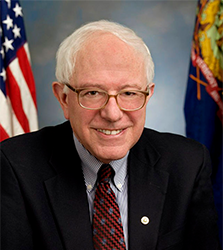
Sanders Closing in on Clinton?
It was probably inevitable that one candidate would rise up to become the primary rival to former Secretary of State Hillary Clinton. At the moment, it looks like Vermont Senator Bernie Sanders is the one making the strongest case to Democratic voters, at least judging by his performance in a Wisconsin straw poll:
Wisconsin straw poll surprise: A narrow Clinton win
Bernie Sanders scored 41 percent in a straw poll vote at the Wisconsin Democratic Party convention this weekend — finishing a close second to Hillary Clinton, who won 49 percent.
The Vermont senator received 208 of 511 delegate votes at the state convention in Milwaukee on Saturday, while Clinton won votes from 252 of the delegates, leaving her just short of a majority. Both Vice President Joe Biden and former Maryland Gov. Martin O’Malley, who announced his candidacy late last month, received 3 percent of the vote. Former Virginia Sen. Jim Webb, who is considering a bid, won 2 percent of the vote, while former Rhode Island Gov. Lincoln Chafee, who announced his long-shot candidacy last week, received 1 percent.
The result is another encouraging sign for Sanders, who is drawing large crowds in early nominating states such as Iowa and New Hampshire. In the two weeks since he announced his candidacy, the Vermont senator has seen an uptick in the polls against Clinton — who remains the heavy favorite — and Sanders is showing signs he could pick up some supporters of Massachusetts Sen. Elizabeth Warren, the progressive icon who has said repeatedly that she will not run for president in 2016...
It's easy to make way too much of these results, as The Hill does with its headline on the story titled "Sanders pulls within 8 points of Clinton in Wisconsin." Delegates to state conventions tend to be far more ideologically driven than caucus and primary voters, as well as more informed on the full range of candidates in the race. I suspect 41 percent of registered Democrats in Wisconsin would be hard-pressed to tell you who Bernie Sanders is, let alone whether they support him for the 2016 Democratic nomination.
Still, the results have to be encouraging for Sanders, suggesting that among a more informed electorate he holds up well against the current frontrunner. Now he just has to hope he can get the caucus and primary voters in early states like Iowa, New Hampshire, South Carolina, and Vermont to be as informed about his candidacy as the Wisconsin Democratic Party state convention attendees were, while at the same time hoping either that none of the other Democratic candidates surpass him as Clinton's chief rival, or at least that the typical ebbing and flowing of support in these sorts of contests has him peaking again once the voting starts in February 2016.



